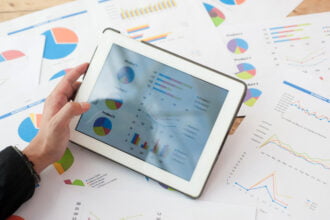Business reporting has been around for a long time but the tools and techniques of business intelligence have refined over time and now with the recent popularity of data driven business approach, data has been identified as the most valuable asset of a business and data analytics and reporting has finally found a key place in the business world. Nearly 70% of all companies have a data-driven strategy to grow their organization. Unfortunately, big data is only useful with the right tools at your disposal.
BI software provides businesses with the opportunity to aggregate and organize data into compatible formats and then present data using a varied range of data reports, charts and graphs. This helps data analysts to understand the relations between business entities and create meaningful links to perform data analytics.
Importance of Business Intelligence
Every day, new data analytic and BI software are making their way into the market and offering new and varied ways to work with data and derive useful information and actionable data insights that can help data analysts to analyze business data and identify the growing trends in the market through their data analysis.
Ad hoc reporting tools offer highly interactive reports that can help management identify the flaws in their business strategies and rectify the mistakes to enhance their product sales. These reporting software can present data in terms of visualizations and other forms of data insights that leads to short term or long term business decisions. Data can be interpreted by business analysts to identify previous market trends and guide the management into taking the business in the right direction.
“Think analytically, rigorously, and systematically about a business problem and come up with a solution that leverages the available data.” – Michael O’Connell, chief analytics officer, TIBCO.
Visualizations and reporting
Visualizations through data reporting software can be the basis of actionable insights and can lead the data team to uncover the mistakes that happen and go unnoticed and can seriously damage the product sales if not taken into account. Visualizations can help data analysts identify those data patterns based on previous years’ data and management can take actions to change their business strategies and increase productivity leading to business growth.
Data visualization can help you drill down data to different levels and gain insight into the internal functioning of business and the performance of different products in the market. Also, business analysts can identify areas of focus where they can improve their marketing efforts and reach the niche to increase conversions.
Features of Business Intelligence tools
Any ad hoc reporting tool may have a number of features to perform data analytics and these power packed features make the BI tool an attractive choice in the eyes of the data analysts’ team for a particular business.
Before purchasing a business intelligence software to unlock the wonders of data analytics and reporting, the data team should perform a detail analysis of their business need and create a reporting tool requirement plan that would help them to purchase the best reporting software to meet their business needs. Following are some important features that data analysts must include in their plan for better data analytics options that may help their business grow.
Easy to use Report designer
The first feature that most business check when they are reviewing business intelligence tools to purchase is the ease of use. How easy is it to design and run the report, as many of the end users are not tech savvy and if the designing interface is too complicated then it would take time and money to arrange staff trainings and familiarization process. Data analysts prefer drag and drop interfaces that are easy to learn and manage and can get things setup and started quickly.
Varied number of Report layouts
The next thing that most data analysts would be interested to find out is the range of reports that the reporting software has to offer as this forms the core area of data analytics and reporting. A varied number of report layouts in a reporting software would give the data analysts the flexibility to choose the best suited report for a data set and also enable them to observe the same data in a variety of ways to identify performance indicators and potential flaws.
Creative Data dashboards
Data dashboards are a new way to monitor and compare data coming from multiple sources. The user can create customized data dashboard according to their needs. This helps data analysts to keep an eye on the critical data in real time that might be changing rapidly and would have an impact on business decisions. Often, users have the option to add or remove reports and also move them around the board according to their own needs giving them chance to customize the data dashboards.
Open to customization
Data reports and graphs available in the business intelligence solution should not be fixed in its format rather it should be open to customization so that users can manipulate data and present the information in a way that helps them to perform desired data analytics and reach conclusions based on the data report. This customization of data report is a very attractive feature in businesses where the data metrics are constantly evolving and the need for new types of reports may arise frequently. In this case, the end users do not need to contact developers for changes in the report layout but they can create customized new reports independently to fulfil their data needs.
Embedded solution
Embedded business intelligence solutions provide users with ease of use and familiarity as the software is directly embedded into the business software making it a part of the existing business workflow. This makes it easy to access and work with as the reporting tool adopts the look and feel of the working software and non-technical users do not have the burden to learn yet another software platform to perform their daily tasks.
Embedded BI software have the added benefit of low cost of maintenance and also extra security is available as the embedded software can adopt the same security protocols as the business software.
List of best BI tools
There are many BI tools available in the software market. Here users can find a list of best business intelligence tools that have a range of power packed features to help data analysts perform their tasks with professional expertise and do not falter in their work due to incapability of the reporting tool.
Tableau
Tableau is a popular business intelligence reporting tool with powerful data reporting capabilities to help users perform business analytics using the business big data from across multiple data sources in the organization.
Zoho analytics
Zoho analytics is a business intelligence suite with a range of products for data reporting and BI. The data reporting module is the Zoho reports that offers users to create customized reports by a drag and drop interface. The interface is very easy to use and can be accessed easily by non-technical staff with minimal training.
Sisense
Sisense is another popular platform that provides architecture solutions as well as reporting software for businesses to perform high performance analytics for business intelligence. The features include end to end reporting and powerful visualizations and support for machine learning and big data.
Dotnet report builder
Dotnet report builder is a cloud based ad hoc reporting tool that lets data analysts create beautiful visualizations and work with a range of data report layouts. They provide users options to apply filters to the data set and target a specific range of data. Data can be presented in the form of data dashboards to monitor and compare different data reports. These features make for powerful data analytics that can help business analysts to identify areas that need more marketing focus or require change in business strategies to increase product sales.
Izenda
Izenda is an embedded analytic BI tool which is very popular for its features like data visualization and dashboards. Its 3-tier architecture lets the data analysts create powerful reports including charts and graphs.










